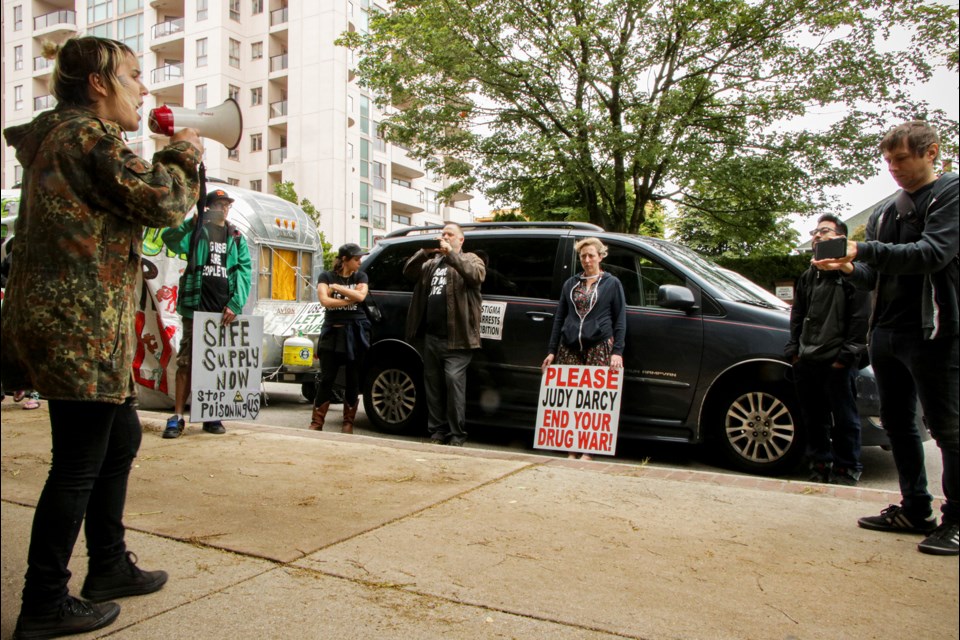About 20 people braved wind and threats of rain to rally outside the office of New Westminster MLA and Judy Darcy Wednesday afternoon.
Organized by long-time drug policy activist Dana Larsen, the rally outside Darcy’s constituency office was the final in a protest circuit of four ministers whose purviews relate to the overdose crisis, including Attorney General David Eby, Solicitor General Mike Farnworth and Health Minister Adrian Dix.
Darcy was nowhere in sight Wednesday afternoon, and Larsen said he’s been trying to arrange a meeting with the mental health and addictions minister for about half a year to no avail.
The rallies, which Larsen is calling “Occupy For Safe Supply,” are calling for the provincial government to enact legislation that would effectively decriminalize drugs. Larsen points to a report from B.C.’s top doctor Bonnie Henry urging the government to decriminalize drug users.
After his rally outside Dix’s office, Larsen said he had a conversation with the health minister, and he asked if the government would heed the provincial health officer’s call.
“He just wouldn’t answer. He would not say ‘yes, I do support it’ or ‘no, I don’t.’ Everytime, he would just talk about something else or give a different answer,” Larsen said.
“I can’t imagine any other public health crisis where the health minister just totally ignores the advice from the province’s chief health officer. If this was SARS or measles or something, and the chief health officer was saying something and he was like ‘whatever,’ that would just be outrageous.”
Larsen: The issue is about decriminalizing people. Everybody uses some form of substance; the decisions in which substances are good and which are bad were rooted in racism. pic.twitter.com/K2OtSOHXef
— dustin godfrey (@dustinrgodfrey) July 17, 2019
He noted the endorsement of decriminalization from a wide array of health-centred organizations, from the B.C. Nurses’ Union and the B.C. Centre for Disease Control to the Canadian Mental Health Association.
While fatal overdoses counted up to 150 per month at the height of the crisis between late-2017 and mid-2018, the most recent data from the B.C. Coroners Service shows the rate of fatal overdoses in B.C. more commonly at 80 per month in the first five months of 2019.
In New Westminster, 10 people have died of overdoses this year – if that rate continues for the rest of the year, it would be about 25 altogether, around the same as in 2017 and about 10 fewer than in 2018.
Eris Nyx says even as overdose deaths have gone down (for the first five months of this year at least...), there’s no end to the #overdosecrisis in sight. There’s just as many people overdosing — and what’s that doing to those affected? pic.twitter.com/0M00yeErEE
— dustin godfrey (@dustinrgodfrey) July 17, 2019
But that doesn’t mean that there are fewer overdoses happening, Eris Nyx told those in attendance over a loudspeaker.
“What does that mean? We’re getting better at traumatizing ourselves, administering naloxone to people who have overdosed on the street. We’re getting better at running overdose prevention services,” Nyx said.
“What kind of mental traumas are this government dealing to people by not changing their regime?”
Meriah Main, a nurse who formerly worked at safe injection site Insite and the Crosstown Clinic, which provides pharmaceutical heroin and injectable hydromorphone to a small group of drug users, said Crosstown patients find their lives stabilizing while on prescription heroin.
“That sounds scary to people that don’t know what that means. They’re working. They have their children. They have meaning in their lives, relationships, friends,” Main said.
“This is a step toward recovery. If someone wants to decrease their drug use, safe supply is a step toward that.”
Meriah Main, a nurse who worked at @InsiteVan and Crosstown Clinic, says people who use heroin everyday through Crosstown are productive members of society. They have family, they have jobs. pic.twitter.com/9sSwtnA7Wz
— dustin godfrey (@dustinrgodfrey) July 17, 2019
The call for drug decriminalization and for a safe drug supply has been growing louder in recent years, as more prominent people add their voices to the cause.
Although the federal Liberal government has dodged calls within its own party to decriminalize drugs, it did commit on Wednesday more than $70 million in new funding for the overdose crisis. That included more than $30 million each for harm reduction and a safe supply projects, such as pharmaceutical heroin or injectable hydromorphone.
However, Larsen said the solution is to reduce funding – specifically for police forces, by ending arrests and detention of drug users for simple possession.
The provincial government, too, has declined to follow Henry’s advice and her plan for de-facto decriminalization.



